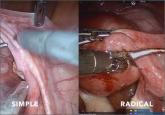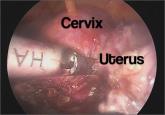Arnold Advincula's Surgical Techniques

Simple versus radical hysterectomy
Anatomical nuances and dissection techniques

A short break in the exhibit hall allowed for mingling with other attendees, many of whom have been active on social media surrounding the meeting, and for visiting the booths of the industry sponsors. The second scientific session then picked up where the first left off, with more scientifically sound research presented on such topics as mechanical bowel preparation use in laparoscopy and pelvic floor disorders in women with gynecologic malignancies.
No room for fads in gyn surgery
Dr. David Grimes, a true leader in our field, provided an exceptional keynote address, “Is Teaching Evidence-Based Surgery Possible?" He shared his expertise of evidence-based medicine, and described (in sometimes very comical but always stimulating and provocative terms) the need for incorporating evidence-based surgery in gynecology. He urged us to strive to do best by our patients by applying evidenced-based practices rather than following fads and gizmos.
Gyn surgery training: Have we reached a “perfect storm”?
The afternoon brought with it a panel discussion on "Teaching the Next Generation of GYN Surgeons," with Dr. Hal Lawrence moderating and Dr. Mark Walters and Dr. Dee Fenner serving as panelists. They discussed the future of ObGyn residency training in great detail: increasing subspecialization, a stable birth rate, declining hysterectomy rates, increasing safety and quality monitoring, and increased access to data and informed consumers. All of these trends were highlighted as reasons for a perfect storm in gynecologic surgery training. In addition, the panel presented some surprising statistics:
Videofest!
The scientific day concluded with a videofest that included complex robotic, laparoscopic, hysteroscopic, cystoscopic, and vaginal surgeries, demonstrating the surgical talents and ingenuity of SGS members.
Simultaneously, the Fellows’ Pelvic Research Network (FPRN) met to update their ongoing projects and to review new proposals. The meeting sought to unite FPRMS and MIS fellows to conduct multicenter studies. This was an enlightening and engaging session, which should give everyone great hope to see the creativity and energy of the next generation of researchers.
A grounder for attendees
All in attendance were treated to a unique, eye-opening, motivational, and very moving talk by Professor (and Sir) Ajay Rane, MD, PhD from Australia on female genital mutilation. He stressed the importance of respecting women for who they are, not what they do.
“My idea of feminism is applauding a woman who gives birth. Celebrate women for who they are," he said. He highlighted the work being done by his team in Australia and India, and urged everyone in attendance to become more aware of the staggering statistics and reality of female genital mutilation.
The jam-packed day wrapped with the awards ceremony in the main hall. Lifelong mentors were honored by their mentees and SGS President Dr. Stephen Metz and Scientific Program Chair Dr. Charles Rardin presented various awards to those who had submitted and presented novel and groundbreaking research.
One last surprise
The President’s Reception in the exhibit hall was lively, with meeting sponsors, colleagues, and friends in attendance. And, of course, a visit from special guest! (Thanks to SGS Fellow Christina Saad, MD @XtinaSaad for the pic!)
See you all tomorrow for another educational, enlightening, and spirited day at #SGS2015!
3/22/15. DAY 1 AT SGS
A focus on evidence-based medicine
Strong analytic skills (of your own research as well as the published literature) translates to better patient care, was the underlying theme of the opening postgraduate course here in Orlando, Florida, for day 1 of the 41st annual meeting of the Society of Gynecologic Surgeons.
Building on the success of last year’s course on evidence-based medicine (EBM), Dr. Vivian Sung and Dr. Ike Rahn put together an amazing team to review and apply the principles of so-called EBM, a workshop that was in part sponsored by ABOG.
A quick introduction to EBM principles by Dr. Thomas Wheeler was followed by small break-out groups, where attendees used the PICO-DD model to define a Population, Intervention, Comparator, Outcomes, Duration, and study Design. Further talks focused on the benefits and caveats of randomized controlled trials (RCTs), surrogate and intermediate outcomes, and systematic reviews and meta-analyses.
Dr. Ethan Balk cautioned us to consider the costly and underpowered RCT, and lack of generalizability needed to define rigorous study inclusion and outcome criteria. Dr. Sung then pointed out that, while the perfect surrogate outcome would allow us to shorten study lengths (and save money), the seduction of association and causation can lead to some questionable conclusions.

Anatomical nuances and dissection techniques

The pros and cons and surgical distinctions of retaining the cervix
